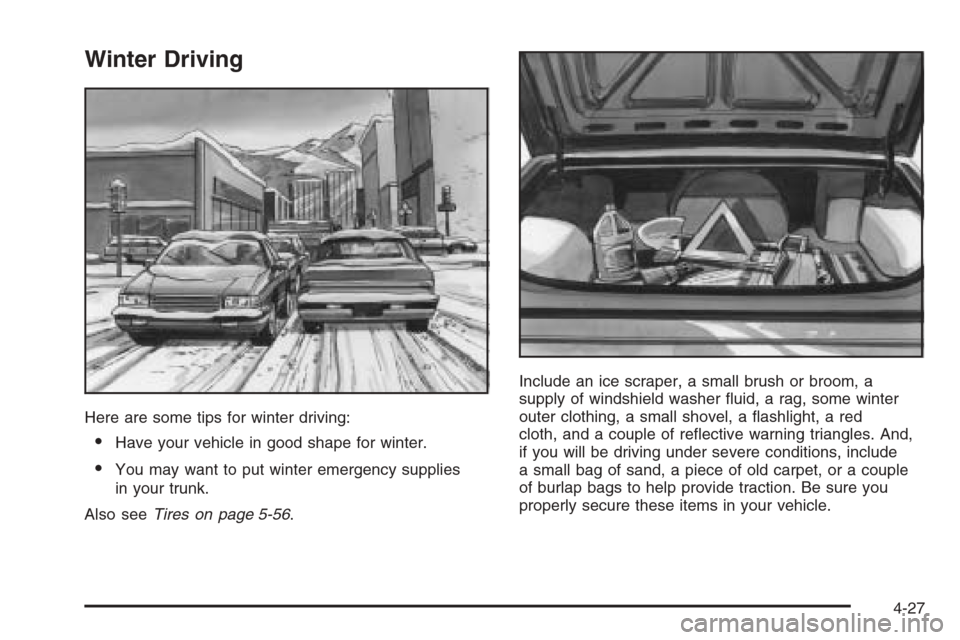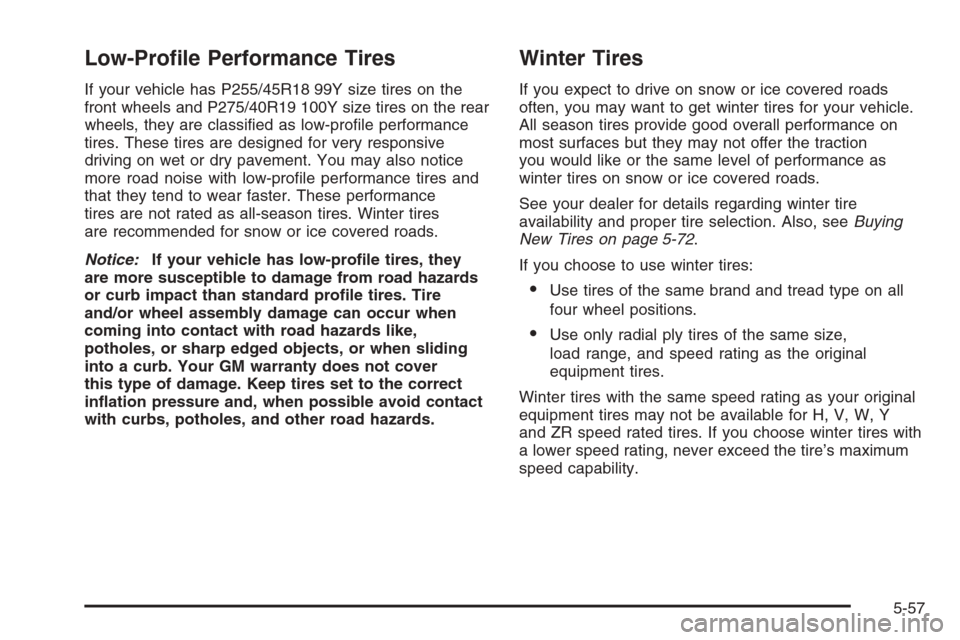winter tires CADILLAC STS 2006 1.G Owners Manual
[x] Cancel search | Manufacturer: CADILLAC, Model Year: 2006, Model line: STS, Model: CADILLAC STS 2006 1.GPages: 480, PDF Size: 2.74 MB
Page 295 of 480

Winter Driving
Here are some tips for winter driving:
Have your vehicle in good shape for winter.
You may want to put winter emergency supplies
in your trunk.
Also seeTires on page 5-56.Include an ice scraper, a small brush or broom, a
supply of windshield washer �uid, a rag, some winter
outer clothing, a small shovel, a �ashlight, a red
cloth, and a couple of re�ective warning triangles. And,
if you will be driving under severe conditions, include
a small bag of sand, a piece of old carpet, or a couple
of burlap bags to help provide traction. Be sure you
properly secure these items in your vehicle.
4-27
Page 296 of 480

Driving on Snow or Ice
Most of the time, those places where the tires meet the
road probably have good traction.
However, if there is snow or ice between the tires and
the road, you can have a very slippery situation. You will
have a lot less traction, or grip, and will need to be
very careful.
What is the worst time for this? Wet ice. Very cold snow
or ice can be slick and hard to drive on. But wet ice
can be even more trouble because it may offer the leasttraction of all. You can get wet ice when it is about
freezing, 32°F (0°C), and freezing rain begins to fall.
Try to avoid driving on wet ice until salt and sand crews
can get there.
Whatever the condition — smooth ice, packed, blowing,
or loose snow — drive with caution.
Traction control improves your ability to accelerate when
driving on a slippery road. Even though your vehicle has
the Traction Control System (TCS), you will want to slow
down and adjust your driving to the road conditions.
Under certain conditions, you may want to turn the TCS
off, such as when driving through deep snow and loose
gravel, to help maintain vehicle motion at lower speeds.
SeeTraction Control System (TCS) on page 4-9,
StabiliTrak
®System on page 4-11,Rocking Your Vehicle
to Get It Out on page 4-32, and “Winter Tires” underTires
on page 5-56.
4-28
Page 371 of 480

Low-Pro�le Performance Tires
If your vehicle has P255/45R18 99Y size tires on the
front wheels and P275/40R19 100Y size tires on the rear
wheels, they are classi�ed as low-pro�le performance
tires. These tires are designed for very responsive
driving on wet or dry pavement. You may also notice
more road noise with low-pro�le performance tires and
that they tend to wear faster. These performance
tires are not rated as all-season tires. Winter tires
are recommended for snow or ice covered roads.
Notice:If your vehicle has low-pro�le tires, they
are more susceptible to damage from road hazards
or curb impact than standard pro�le tires. Tire
and/or wheel assembly damage can occur when
coming into contact with road hazards like,
potholes, or sharp edged objects, or when sliding
into a curb. Your GM warranty does not cover
this type of damage. Keep tires set to the correct
in�ation pressure and, when possible avoid contact
with curbs, potholes, and other road hazards.
Winter Tires
If you expect to drive on snow or ice covered roads
often, you may want to get winter tires for your vehicle.
All season tires provide good overall performance on
most surfaces but they may not offer the traction
you would like or the same level of performance as
winter tires on snow or ice covered roads.
See your dealer for details regarding winter tire
availability and proper tire selection. Also, seeBuying
New Tires on page 5-72.
If you choose to use winter tires:
Use tires of the same brand and tread type on all
four wheel positions.
Use only radial ply tires of the same size,
load range, and speed rating as the original
equipment tires.
Winter tires with the same speed rating as your original
equipment tires may not be available for H, V, W, Y
and ZR speed rated tires. If you choose winter tires with
a lower speed rating, never exceed the tire’s maximum
speed capability.
5-57
Page 386 of 480

Buying New Tires
GM has developed and matched speci�c tires for your
vehicle. The original equipment tires installed on
your vehicle, when it was new, were designed to meet
General Motors Tire Performance Criteria Speci�cation
(TPC Spec) system rating. If you need replacement
tires, GM strongly recommends that you get tires with
the same TPC Spec rating. This way, your vehicle
will continue to have tires that are designed to give the
same performance and vehicle safety, during normal
use, as the original tires.
GM’s exclusive TPC Spec system considers over a
dozen critical speci�cations that impact the overall
performance of your vehicle, including brake system
performance, ride and handling, traction control, and tire
pressure monitoring performance. GM’s TPC Spec
number is molded onto the tire’s sidewall by the tire
manufacturer. If the tires have an all-season tread design,
the TPC Spec number will be followed by an MS for mud
and snow. SeeTire Sidewall Labeling on page 5-58for
additional information.The optional 18-inch performance tires, size 255/45ZR18
99Y, used on some vehicles, meet the General Motors
Tire Performance Criteria Speci�cation (TPC Spec) rating
but the TPC Spec code has not been molded onto the
tire’s sidewall. If your vehicle has these tires, and you
need to replace them, you can still get these TPC Spec
rated tires by asking your GM dealer. Your GM dealer can
order these tires by part number. This way, your vehicle
will continue to give the proper endurance, handling,
traction, and ride as the original tires.
Winter tires with the same speed rating as your original
equipment tires may not be available for H, V, W, Y
and ZR speed rated tires. If you choose snow tires with
a lower speed rating, never exceed the tire’s maximum
speed capability.
5-72
Page 389 of 480

Uniform Tire Quality Grading
Quality grades can be found where applicable on the
tire sidewall between tread shoulder and maximum
section width. For example:
Treadwear 200 Traction AA Temperature A
The following information relates to the system
developed by the United States National Highway
Traffic Safety Administration (NHTSA), which grades
tires by treadwear, traction, and temperature
performance. This applies only to vehicles sold in the
United States. The grades are molded on the sidewalls
of most passenger car tires. The Uniform Tire Quality
Grading (UTQG) system does not apply to deep
tread, winter-type snow tires, space-saver, or temporary
use spare tires, tires with nominal rim diameters of
10 to 12 inches (25 to 30 cm), or to some
limited-production tires.
While the tires available on General Motors passenger
cars and light trucks may vary with respect to these
grades, they must also conform to federal safety
requirements and additional General Motors Tire
Performance Criteria (TPC) standards.
Treadwear
The treadwear grade is a comparative rating based on
the wear rate of the tire when tested under controlled
conditions on a speci�ed government test course.
For example, a tire graded 150 would wear one and
a half (1.5) times as well on the government course as
a tire graded 100. The relative performance of tires
depends upon the actual conditions of their use,
however, and may depart signi�cantly from the norm
due to variations in driving habits, service practices,
and differences in road characteristics and climate.
Traction – AA, A, B, C
The traction grades, from highest to lowest, are AA,
A, B, and C. Those grades represent the tire’s ability to
stop on wet pavement as measured under controlled
conditions on speci�ed government test surfaces
of asphalt and concrete. A tire marked C may have
poor traction performance.
Warning:The traction grade assigned to this tire is
based on straight-ahead braking traction tests, and
does not include acceleration, cornering, hydroplaning,
or peak traction characteristics.
5-75